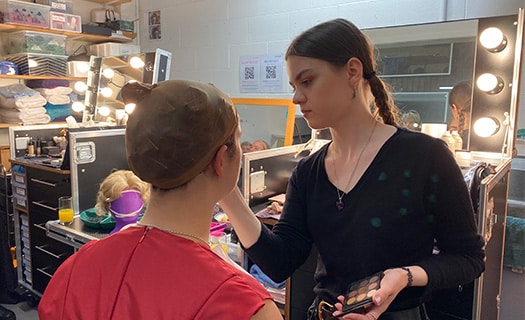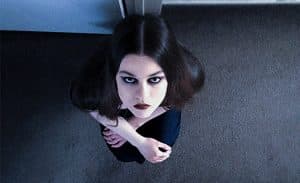Dancing with Dyscalculia
Diagnosed with severe dyscalculia as a child, 21-year-old Isabelle went on to become a freelance makeup artist and to support others who struggle with numbers.
“My dyscalculia affected me severely as a child. I always felt different amongst my friends. I couldn’t understand why I couldn’t manage maths work as easily as they could, no matter how much effort I put in. My mental health definitely became negatively affected.

“Mum contacted SPELD, and through them we found an educational psychologist who formally diagnosed me with dyscalculia in 2012. I remember feeling really good that I now knew why my brain processed maths the way it did. I had the false expectation that as soon as I got diagnosed, I could tell my teachers and they would then know how to help me. Sadly, dyscalculia is commonly misunderstood and often gets missed due to lack of knowledge. This means there is usually little to no support or guidance during school age years and beyond.
“Mum attempted to tutor me in maths using every visual possible but she quickly realised my brain processed numbers differently and that she couldn’t unlock the door to the maths part of my brain to help me. Eventually we found a specialist dyscalculia tutor who taught me twice a week, which extended to three or four sessions a week during school holidays. I was able to successfully complete NCEA Levels 1, 2 & 3. Despite my issues with maths, I enjoyed success in the arts during my high school years. We all have strengths – it’s just a matter of finding out where yours are.
I created my Instagram Dancing with Dyscalculia when I was about 15 years old. As I went further down the dyscalculia rabbit hole, I began to realise that there was a lack of good information available. What better way to educate and raise awareness, in this day in age, than social media? I like engaging online with people who have dyscalculia as I can relate to them, and I enjoy helping others where I can. I called my Instagram Dancing with Dyscalculia as I was heavily involved with performing arts growing up. It’s all about persevering through life with dyscalculia – having dyscalculia and experiencing personal success.
A regular maths tutor cannot help you.
“I manage my dyscalculia a lot better as an adult. I think that is due to the help I received from my specialist tutor, and also just maturity. I usually have to write the date out in full, as I can sometimes get the numbers the wrong way round. Sometimes I need help to read expiry dates on consumables. I get a family member or friend to go over any payment forms I fill out just in case I’ve made a mistake. I am terrible at remembering family and friends’ birthdays as well – to help wit this I use my phone calendar.
Little things like that still prove to be difficult. Using a calculator and counting on my fingers helps a lot. Being able to ask for help with anything I’m unsure about is also important to me.
“If there is someone who is reading this who has dyscalculia, or perhaps has a loved one who has dyscalculia, please know that it gets better. I would strongly recommend getting assessed for overall learning impairments, to see if you do have dyscalculia or anything else hindering your progress. Finding a tutor who specialises in dyscalculia was incredibly important to me, however they are few and far between. A regular maths tutor cannot help you. Good mental health can definitely be difficult if you have dyscalculia. If you or your child is struggling, please keep going. Never stop sending those emails to teachers with information about dyscalculia, never stop talking about dyscalculia. You’re not stupid. Your brain processes numbers differently from others and you learn differently. Everyone is unique. We all add something to this world.”
For more on Isabelle, see her Instagram @dancingwithdyscalculia
To find out more about dyscalculia, see the Dyscalculia page on SPELD NZ’s website.







